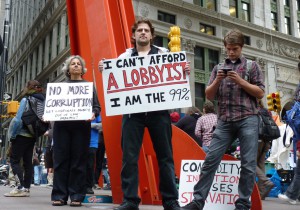Winning Progressive takes on some recent right-wing push-back and misdirection as the issue of income inequality gains resonance with the American public:
Showing how out of touch they are with everyday Americans, conservatives have latched
onto the news that the share of national income taken in by the top 1% fell from 23% in 2007 to “only” 17% in 2009 to contend that the focus of Occupy Wall Street and others on economic inequality is somehow misguided. For example, in a post titled “The 1% Ain’t What It Used To Be,” conservative blogger Megan McCardle responded that “we don’t want to spend years focused on income inequality, only to learn that the financial crisis fixed it for us.” Conservative economics professor Steven Kaplan of the University of Chicago business school echoed such doubts and actually offered a defense of inequality, stating in the New York Times that:
“It’s very interesting that [inequality] has become such a big topic now when the numbers are back to where they were in the 1990s,” said Steven Kaplan, an economist at the University of Chicago’s business school. “People didn’t seem to be complaining about it then.”
Pointing to the recent declines at the top, Mr. Kaplan argues the Occupy protesters have accused the wrong villain by focusing on inequality, which he called an inevitable byproduct of growth. “If you want to reduce inequality, all you need to do is put the economy in a recession,” he said. “If you want the economy to do well, as all of us do, then you’ll get more inequality.”Kaplan’s effort to link growth and economic inequality as inherently related is historically incorrect. For example, from 1950 to 1980, the share of income taken by the top 1% remained below 12% in all but one year, and was below 10% in 13 of those years. During that same time period, the US economy experience virtually uninterrupted growth. When the economy dipped in the early 1980s, the share of income taken by the top 1% increased. While it is true that most recessions lead to a decline in the share of income for the top 1%, the historical record does not support the contention that economic inequality is the inevitable byproduct of growth. In addition, while some level of inequality may be necessary for economic growth, elevated levels of inequality – such as those in the US today - actually stunt economic growth.
The claim that we shouldn’t be focused on economic inequality because of the decline in the top 1%’s share of national income in 2009 is similarly offbase for a few reasons. First, there is little reason to believe that the 2009 decline is anything but a brief aberration. A significant portion of the reduced income share for the top 1% in 2009 was due to declines in the stock market and capital gains from investments. But the stock market has largely recovered and other economic factors that reflect significant wealth generation for the top 1% have fully rebounded since 2009. Corporate CEO salaries skyrocketed in 2010 and a number of hedge fund managers each took in more than $1 billion in 2010. As the chart below shows, corporate profits rapidly recovered from the recession low point, even as unemployment has stayed far too high and average incomes have stagnated. In other words, the top 1% have fully rebounded, while the rest of the country continues to suffer from the economic havoc wreaked by the Bush Recession.
In addition, economic inequality is a significantly more salient issue now than it was in the 1990s because growing income inequality is increasingly accompanied by attacks on the social safety net and a decline in middle class economic security. While conservatives have always criticized government programs that benefit anyone except the wealthy, for the most part there were not serious efforts in the 1990s to dismantle Social Security, Medicare, and Medicaid, and states in the 1990s were largely able to keep operating programs that directly benefited the poor. Similarly, in the 1990s there were higher levels of unionization, more employers provided health insurance, and public universities were far more accessible to working class and poor people looking to better their economic lot in life. Today, all that has changed, and conservatives have launched all-out onslaughts against Social Security, Medicare, and other programs that benefit average Americans. Depending on the results of the 2012 elections, the success of such attacks is a frighteningly real possibility. So, to answer Mr. Kaplan’s question, part of why economic inequality matters more now than it did in the 1990s is that the governmental and societal supports that helped minimize economic inequality are substantially weaker or are under full out attack from the conservatives who do the bidding of the top 1%.
Third, conservatives ignore the fact that Occupy Wall Street and other movements against economic inequality are about more than just what share of income goes to each income level. Instead, such groups are worried about how a rapidly growing concentration of wealth among the top 1% has created a situation where our political and economic systems are increasingly unable to respond to any interests outside of those of the top 1%. As we’ve explained previously, the goal of Occupy Wall Street is to try to break that stranglehold so that our political and economic system can get back to governing in the best interests of we the people. Nothing about a temporary decline in the top 1%’s share of national income changes the critical importance of achieving that goal.
With economic inequality an increasingly salient political issue for everyday Americans, conservatives are desperate to try to change the subject. But the issue of inequality will go away only after we achieve fundamental reform of our political and economic systems, not simply because of a minor and temporary dip in the economic standing of the wealthy elite.



No comments:
Post a Comment